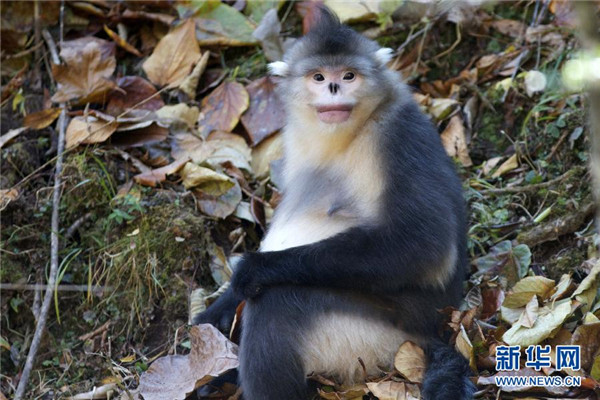Endangered monkey making a comeback in Tibetan reserve
 0 Comment(s)
0 Comment(s) Print
Print E-mail China Daily, July 22, 2014
E-mail China Daily, July 22, 2014
|
Yunnan snub-nosed monkey. [Photo/Xinhua] |
The animal lives between 3,500 and 4,600 meters above sea level, the highest habitat of any known primate, and it feeds on lichens and pine cones, according to Pyingtsuo.
The area now has three groups of the monkeys, compared with only two when the reserve was set up as a county-level reserve in the mid-1980s, Pyingtsuo said.
"The largest group has more than 300 individuals," said Silang Tsering, who has been a full-time forest guard for 14 years.
He and his colleagues patrol the reserve once a month during the rainy season and three times during the dry season, mainly to guard against fires.
Each patrol takes about three days. They walk more than 15 kilometers a day in the mountains, taking along dry food and sleeping bags, and they often spend the night at deserted farm shacks.
"We take note of every animal we encounter," said Silang, adding that monitoring the monkeys has been their main task.
They have drawn three patrol routes based on the monkeys' sphere of activity.
After working years in the reserve, the forest guards are familiar with the habits of the animals.
With his naked eyes, Silang can count the snub-nosed monkeys in a group by waiting until they gather to rest on trees toward evening.
"After doing the job for so many years, I have developed an affection for the monkeys and other animals, and I don't want to give up the work," said the 38-year-old, who earns 2,200 yuan a month. The income is relatively low compared with working in a city.
In addition to the full-time forest rangers, the local government has hired 520 villagers from nearby as part-time forest guards.
Hunting was once a major threat to the monkeys. However, many former hunters have now become protectors, according to Pyingtsuo.
Their responsibilities include guarding against fires, illegal hunting and other potential threats. They receive a steady subsidy, with the highest being 1,700 yuan per month, from the local government.






